Michele Foucault died the month I was born. I would believe in reincarnation but I was already 24 days old when the doctors declared him dead of a brain hemorrhage in Paris. In reality it was AIDS that killed him, but I have often thought there is a certain morbid poetry in saying a philosopher died from a bleeding brain.
Perhaps I’m better off not being a post-modern bodhisattva of Michele Foucault. Throughout his life he often remarked he didn’t know what all the fuss was about. He didn’t think his own philosophy was as significant, as the lengthy list of secondary texts it spawned would suggest. He once remarked that not even he likes his work. After his death a note was found on the writing desk of his apartment requesting that none of his work be published posthumously and several manuscripts should be destroyed.
As a philosopher he was not a systematic thinker. His early works contradict his later works, and individual texts even refute themselves. He wasn’t interested in the big questions like free will or the existence of God. He didn’t make any contributions to the contemporary philosophies of Phenomenology or Structuralism, and instead held them in contempt. It is very hard to place him in the timeline of our intellectual history for he did not follow the appropriate dialectic of thought (i.e. Marx responded to Hegel who responded to Kant who responded to Hume). In this story he appears an erratic loner.
As a man he struggled with alcohol until late in his life, and was known for drinking and then driving his bright red sports car. He was an active member of the gay S and M scene, and was France’s first high profile death from AIDS (which in 1984 was still hush-hush).
But for all that he was a force to be reckoned with. He was a fiercely independent thinker who created a new way to look at society, thought and language. A new position was created for him to continue his unique work at the Ecole de France. The Phenomenologists and the Structuralists found a worthy adversary in him. His works have divined methodologies to discuss the complex development and histories of sexuality, criminality, insanity, and history itself. These works (despite his own conviction of their inconsequence) have ignited the curiosity of scholars in every dusty corner of academia. Foucault inspired studies have cropped up in everything from a history of grief to a history of gardens. Now every grad student in America must know a few key phrases from Foucault (whether they’ve read him or not), just to save face in discussions. Somehow this curious bald man from Paris was able to tilt the world of thought in his direction.
So there is a part of me that wishes I was born a month later so I could actually boast I was Foucault reincarnated. Instead I must be content with the fantasy that from his deathbed Foucault was preparing for my arrival. He drafted that note rejecting the publishing of his works, so that many years later I would have to travel to France to find them. Did he foresee that kid from Minnesota would find some buried treasure of thought, in his archived but unpublished works and pick up where he left off, after a 23 year long scavenger hunt? I’ve nursed this unhealthy idea on long train rides to pass the time.
So now I’ve followed the tilt in the world made by Foucault and made my way to France to learn Foucault’s language and find what he left for me. The project before me is modest enough, yet has consumed the better part of my waking hours for the past 6 months.
His most notable works outline the historic development of particular Western institutions, such as mental asylums, prisons, and hospitals. In doing so he outlines a methodology for describing the necessary conditions in human understanding to create such institutions. For example, how did we arrive at our contemporary idea of the insane or criminal, and why does that idea demand incarceration in highly specialized facilities? When one pauses to think about it, it is really quite strange. Or as professor Deutscher, who first introduced me to Foucault, would say, “well isn’t that curious”. Indeed it is. Foucault has an uncanny ability to make the commonsensical curious.
Somehow I’ve become interested in the curious institution of the art museum. Perhaps is was the many hours I spent in museums as a child, or just growing up in a family that would travel great distances just to see them (some kids grew up camping in Yellowstone, I grew up road tripping to the MET). I’m interested in how at this point in our intellectual history we have come to see museums as both necessary and sufficient. I’m interested in the idea that museums are necessary as a means to preserve our culture, and sufficient for presenting it. There are few things so complex and vast as the idea of “the museum” with all of its individual players, unique terminologies, logistical concerns, social and cultural values, and specific ways of thinking. How does one even begin?
Perhaps Foucault has some insight. Just before Foucault died in 1984 he was contracted to write a book about art. More specifically it is about Manet. Foucault never wrote the book but the basis of it was outlined in a series of lectures he delivered in Tunis in 1981. A good bit of footnote searching can turn up the occasion mention of these lectures, and a few internet sites boast having excerpts. These limited sources explain that Foucault argues that Manet is historically significant because he was the first artist to paint for the museum. Foucault says Manet conceived his paintings specifically so they would be archived, preserved within the institution of the museum. This was a fundamental break with previous artists who were painting for domestic or ecclesiastical interiors and architecture, and while they were often conceptually complex, they were ultimately decorative. It is these lectures I’m going to go find.
There are many things to say about what museums can do and what they tell us. In a lesser-known lecture Foucault says, “I am interested in the spaces in life that intersect with all others.” And in a way the museum really does intersect with the rest of the world. It is a microcosm of collected knowledge made material. It is a macrocosm of individual understanding. If we follow the logic of the museum to its extreme it, we can imagine a fabulous building that contains the whole world and everything in it from all time. Already history museums try to accumulate everything that has been made, and certain museums of art and technology try to accumulate everything that will be made. The idea of the museum divides the history of the world at the present with an infinite past on one side and an infinite future on the other. Both parts are infinitely full of things to be gathered. So we can imagine this magical museum with walls big enough to encompass the world and envelope time. Isn’t that curious? What does this tell us about how we think, and how we learn about our world? What can a history of the museum do to tell us a history of man? I will argue it can do quite a lot, and that Foucault is the docent at this magic museum. If I’m patient enough and persistent enough, perhaps he will give me a tour.
In search of answers I packed a bag with little more than underwear, a copy of Foucault’s The Order of Things, and a French/English dictionary and flew to France. What follows is an account of my adventures and misadventures as I perambulate and postulate (ponder and pander? Slobber and slink?) my way across Europe visiting the great museums and reading the lost texts of Michel Foucault.
Travel blog of Alex as he combs Eurasia in search of trouble and the lost lectures of Foucault.
Thursday, May 31, 2007
Subscribe to:
Post Comments (Atom)
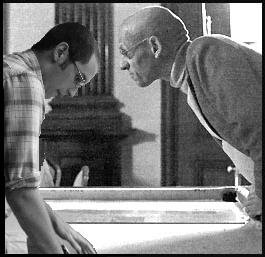

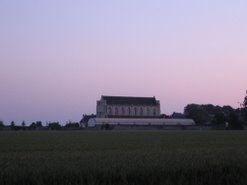

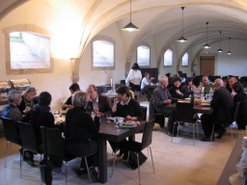
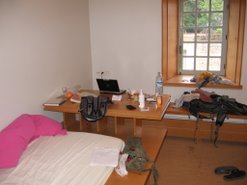



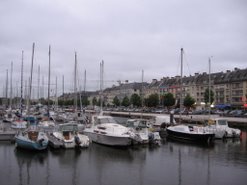









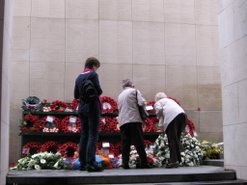


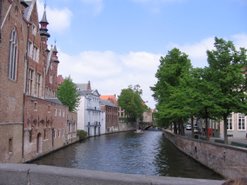
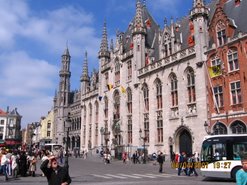





No comments:
Post a Comment